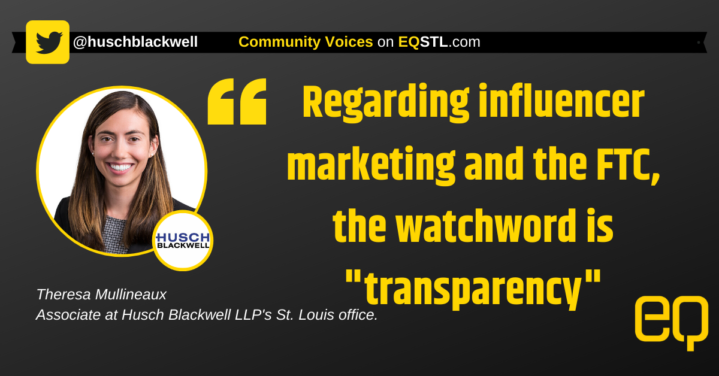
If You’re Using Sponsored Content You Need to Make Sure You’re on the Right Side of the FTC
The watchword is "transparency."

Writing by Theresa Mullineaux. Theresa Mullineaux is an associate in Husch Blackwell LLP’s St. Louis office. Shannon Peters also served as an author for this article.
For startups, social media can offer cheap and effective publicity. However, startups must be mindful that any advertising, including on social media, will require you to comply with federal regulations.
While sponsored content regulations once went largely unenforced against social media based advertising, times are changing. Advertising on social media is increasingly drawing the eye of regulators.
Federal Trade Commission (FTC) regulations demand honesty and transparency in advertising, and fortunately, honesty and transparency will keep your company compliant.
FTC Sued Lord & Taylor
In 2016, the FTC sued retailer Lord & Taylor alleging the company paid online influencers to post pictures of themselves wearing a specific Lord & Taylor article of clothing. The posts failed to disclose that Lord & Taylor provided the clothing for free and paid each influencer thousands of dollars.
Lord & Taylor also paid for a positive review in the online publication Nylon that appeared without any form of notice that it was a paid promotion.
What many startups don’t realize is that your company is responsible for others’ posts if you pay for the posts – tracking paid posts to ensure regulatory compliance is obligatory. The product sold out quickly, but the FTC sued Lord & Taylor.
The case ultimately settled, and the settlement will affect Lord & Taylor for up to twenty years. Lord & Taylor did not create the posts that got them into trouble; they only failed to require the influencers to disclose their relationship with Lord & Taylor.
FTC Activity
In 2017, the FTC reviewed Instagram posts by celebrities, athletes, and other influencers and sent letters to ninety individuals warning them that they were required to conspicuously disclose any material connections between themselves and the companies whose products they endorse.
Later in 2017, the FTC sued two owners of a YouTube channel for failing to disclose their material connections with a company whose products they gave positive reviews. For a brief but persuasive case for enforcing sponsored content regulations, see the publically available article Influencers Under Fyre.
Young companies should be aware of the general sponsored content rules, and should seek expert counsel to resolve ambiguities. The FTC prohibits deceptive advertisements and testimonials.
FTC guidelines do not purport to describe every possible scenario in which an advertisement or testimonial could be deceptive. Rather, “whether a particular endorsement or testimonial is deceptive will depend on the specific factual circumstances of the advertisement at issue.”
The regulations are extensive, but a rule of thumb is to be scrupulously honest and transparent. The FTC’s website provides, “the watchword is transparency. An advertisement or promotional message shouldn’t suggest or imply to consumers that it’s anything other than an ad.”
Below are a few examples of ways to stay transparent about your use of sponsored content.
- Do not represent someone as a user of your product if they are not an actual and present user of your product. When you see a Wrangler commercial featuring former NFL quarterback Brett Favre, remember Wrangler would be violating FTC regulations if (1) Brett Favre was not a user of Wrangler jeans at the time the advertisement was made and (2) Wrangler did not have good reason to believe Favre wears Wrangler jeans at any point when they are running commercials featuring Favre.
- If you change your product, you must contact your endorsers and check if they continue to hold the views presented in your advertisements. You may not use the endorsement of a discontinued product for a current product if the endorser does not endorse the current product. You must also ensure paid endorsers accurately represent your product. If you put out an advertisement you and the endorser both know to be false, you and the endorser are both violating the law.
- Be especially cautious when hiring bloggers. Paid bloggers cannot make unsubstantiated claims about a product. FTC guidelines give the example of a skin care products company who hires a blogger. If the blogger makes unsubstantiated claims about the company’s products, the company is breaking the law. As a general rule, do not let your paid endorsers say for you what you cannot say yourself. If it would be false advertising for you to say your product cures eczema so you must not let a paid endorser say that. Further, representations about the effectiveness of a product must be consistent with the typical results of using the product. If your product occasionally cures eczema, but typically does not, you may not advertise your product as curing eczema. Adding a disclaimer the result is not typical is probably insufficient.
- Beware of “expert opinions”. If an endorser is represented as an expert, the “endorser’s qualifications must in fact give the endorser the expertise that he or she is represented as possessing with respect to the endorsement.” The FTC provides the example of the endorser of an automobile who holds himself or herself out as an engineer. If the endorser is a mechanical engineer well acquainted with automobiles, there is no issue. But, if the endorser is a chemical engineer with limited knowledge of automobiles, holding the endorser out as an expert is deceptive even though the endorser is an engineer.
These are just a few examples of what is, and is not, permitted under FTC sponsored content regulations. The best practice for a young company is to err on the side of honesty and transparency.


